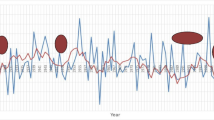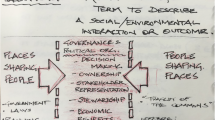Abstract
This article uses practice theory to examine changes in middle class water tenure in Kolkata, India, at the household level from the 1960s to present. Surveys (n = 34) and focus group discussions (n = 4) reveal that the Kolkata urban middle class have transformed not only how they engage water, but their perceptions of water itself. Over the study period, households have: (1) shifted their sources of water; (2) introduced new end uses for water; (3) adopted new water-related technologies; and (4) changed their perceptions of water quality. More specific findings include movement away from public sources towards private sources of water, which are perceived to be of higher quality and greater convenience. Furthermore, all households draw upon multiple water sources and all employ technologies to further harness, process, or transform water (e.g., 100% both filter their water and have a cistern toilet). This influence on the social hydrology of Kolkata ultimately demonstrates their middle class social position and their ability to commodify water. A diversity of water sources, personally treated supplies, and the capital required to secure such a waterscape are increasingly being used to reinforce middle class status, both outwardly and inwardly. These results are distinguishable at the household and society scales, and they can be observed in everyday practices.

Similar content being viewed by others
References
Appadurai A (1996) Modernity at large: cultural dimensions of globalization. University of Minnesota Press, Minneapolis
Basu SR, Main HAC (2001) Calcutta’s water supply: demand, governance and environmental change. Appl Geogr 21:23–44
Baviskar A, Ray R (2011) Introduction. In: Baviskar A, Ray R (eds) Elite and everyman: the cultural politics of the Indian middle classes. Routledge, New Delhi, pp 1–26
Biswas AK, Rangachari R, Tortajada C (2009) Water resources of the Indian subcontinent. Oxford University Press, New Delhi
Bourdieu P (1984) Distinction: a social critique of the judgement of taste. Routledge, London
Bourdieu P (1990) The logic of practice. Polity Press, Oxford
Briscoe J, Malik RPS (2006) The water economy of India: bracing for turbulence. Oxford University Press, New Delhi
Chaplin SE (2011) The politics of sanitation in India: cities, services and the state. Orient BlackSwan, New Delhi
Chenoweth J (2008) Minimum water requirement for social and economic development. Desalination 229:245–256
Chhotray V (2011) The anti-politics machine in India: state, decentralization and participatory watershed development. Anthem Press, London
D’Souza Radha (2006) Interstate disputes over Krishna waters: law, science and imperialism. Orient Longman, Hyderabad
D’Souza Rohan (2008) River-linking and its discontents: the final plunge for supply-side hydrology in India. In: Lahiri-Dutt K, Wasson R (eds) Water First: issues and challenges for nations and communities in South Asia. SAGE Publications, New Delhi, pp 99–121
Dasgupta S (2012) Rethinking participation: water, development and democracy in neo-liberal Bangalore. South Asia 35(3):520–545
Datta P (2012) Planning the city: urbanization and reform in Calcutta, c. 1800-c. 1940. Tulika Press, New Delhi
Donner H (ed) (2011) Being middle-class in India: a way of life. Routledge, New York
Doron A, Raja I (2015) The cultural politics of shit: class, gender and public space in India. Postcolonial Stud 18(2):189–207
Engel K, Jokiel D, Kraljevic A, Geiger M, Smith K (2011) Big cities, big water, big challenges: water in an urbanizing world. World Water Forum, Berlin
Evans D, McMeekin A, Southerton D (2012) Sustainable consumption, behaviour change policies and theories of practice. Collegium 12:113–129
Fagan B (2011) Elixir: a history of water and humankind. Bloomsbury Press, New York
Fam D, Lahiri-Dutt K, Sofoulis Z (2015) Scaling down: researching household water practices. ACME 14(3):639–651
Fernandes L (2011) Hegemony and inequality: theoretical reflections on India’s ‘new’ middle class. In: Baviskar A, Ray R (eds) Elite and everyman: the cultural politics of the Indian middle classes. Routledge, New Delhi, pp 58–82
FICCI (Federation of Indian Chambers of Commerce and Industry) (2011) Water use in India industry survey. FICCI Water Mission, New Delhi
Folke S (1998) Conflicts over water and land in South Indian agriculture: a political economy perspective. Econ Political Wkly 33(7):341–349
Freed SA (1970) Caste ranking and the exchange of food and water in a north Indian village. Anthropol Q 43(1):1–13
Gandy M (2004) Rethinking urban metabolism: water, space, and the modern city. Cities 3:363–379
Geertz C (1973) Thick description: toward an interpretive theory of culture. In: Geertz C (ed) The interpretation of cultures: selected essays. Basic Books, New York, pp 3–32
Giddens A (1984) The Constitution of society: outline of the theory of structuration. Polity Press, Cambridge
Giddens A (1991) Modernity and self-identity. Polity Press, Cambridge
Gleick PH (1996) Basic water requirements for human activities: meeting basic needs. Water Int 21(2):83–92
Gleick PH (2002) Water management: soft water paths. Nature 418:373
Gleick PH (2003) Global freshwater resources: soft-path solutions for the 21st century. Science 302:1524–1528
Harriss-White B (2015) Middle India and urban-rural development: four decades of change. Springer, New Delhi
Juran L, MacDonald MC (2014) An assessment of boiling as a method of household water treatment in South India. J Water Health 12(4):791–802
Juran L, MacDonald MC, Basu NB, Rajagopal R, Rajagopalan P, Philip L (2016) Development and application of a multiscalar, participant-driven water poverty index in post-tsunami India. Int J Water Resour Dev. doi:10.1080/07900627.2016.1253543
Kripalani RH, Kumar P (2004) Northeast monsoon rainfall variability over south peninsular India vis-à-vis the Indian Ocean dipole mode. Int J Climatol 24:1267–1282
Lahiri-Dutt K (2014) Researching world class watering in metropolitan Calcutta. ACME 14(3):688–699
Lahiri-Dutt K, Harriden K (2008) Act on gender: a peep into intra-household water use in the Australian Capital Territory (ACT) Region. J Rural Soc 17(3):230–242
Lahiri-Dutt K, Sil P (2014) Women’s ‘double day’ in middle-class homes in urban India. Contemp South Asia 22(4):389–405
Longhurst R (2010) Semi-structured interviews and focus groups. In: Clifford N, French S, Valentine G (eds) Key methods in geography. SAGE Publications, Thousand Oaks, pp 103–115
Macdonald DMJ, Kulkarni HC, Lawrence AR, Deolankar SB, Barker JA, Lalwani AB (1995) Sustainable groundwater development of hard-rock aquifers: the conflict between irrigation and drinking water supplies from the Deccan basalts of India. British Geological Survey, Nottingham
McKenzie D, Ray I (2009) Urban water supply in India: status, reform options and possible lessons. Water Policy 11:442–460
Mehta L (2008) Contexts and constructions of scarcity. In: Baviskar A (ed) Contested grounds: essays on nature, culture, and power”. Oxford University Press, New Delhi, pp 38–58
Misa TJ (2003) The compelling tangle of modernity and technology. MIT Press, Cambridge
Moench M, Caspari E, Dixit A (1999) Rethinking the Mosaic: investigations into local water management. Nepal Water Conservation Foundation, Kathmandu
Mosse D (1999) Colonial and contemporary ideologies of ‘community management’: the case of tank irrigation development in South India. Mod Asian Stud 33(2):303–338
Mosse D (2003) The rule of water: statecraft, ecology and collective action in South India. Oxford University Press, New Delhi
Mukherjee SN (1977) Calcutta: myths and history. Subarnarekha, Kolkata
Ortner SB (1984) Theory in anthropology since the sixties. Comp Stud Soc Hist 26(1):126–166
Ortner SB (2006) Anthropology and social theory: culture, power, and the acting subject. Duke University Press, Durham
Rahaman MM (2006) The Ganges water conflict: a comparative analysis of 1977 agreement and 1996 treaty. Asteriskos 1(2):195–208
Rao KL (1975) India’s water wealth: its assessment, uses and projections. Orient Longman, New Delhi
Rea LM, Parker RA (2014) Designing and conducting survey research: a comprehensive guide. Jossey-Bass Publishers, San Francisco
Reckwitz A (2002) Toward a theory of social practices: a development in culturalist theorizing. Eur J Soc Theory 5(2):243–263
Reddy VR, Dev SM (2006) The canvas: policies, institutions, and technologies. In: Reddy VR, Dev SM (eds) Managing water resources: policies, institutions, and technologies. Oxford University Press, New Delhi, pp 1–22
Robbins P (2012) Political ecology: a critical introduction. Wiley, Chichester
Roepke I (2009) Theories of practice: new inspiration for ecological economic studies on consumption. Ecol Econ 68(10):2490–2497
Roy D (2015) Understanding the Delhi urban waterscape through the actor network theory. Public Works Manag Policy 20(4):322–336
Samaddar SP (1978) Calcutta. The Corporation of Kolkata, Kolkata
Schatzki T (1996) Social practices: a Wittgensteinian approach to human activity and the social. Cambridge University Press, Cambridge
Schatzki T, Cetina KK, von Savigny E (eds) (2001) The practice turn in contemporary theory. Routledge, London
Shaban A, Sharma RN (2007) Water consumption patterns in domestic households in major cities. Econ Political Wkly 42(23):2190–2197
Shah T, van Koppen B (2006) Is India ripe for integrated water resources management? Fitting water policy to national development context. Econ Political Wkly 41(31):3413–3421
Shove E (2005) Stuff, image and skill: towards an integrative theory of practice. Presented at the designing and consuming: objects, practices and processes workshop, Durham University, Durham, 11 Jan 2005
Shove E, Pantzar M, Watson M (2012) The dynamics of social practice: everyday life and how it changes. Sage Publications, London
Srinivas T (2002) Flush with success: bathing, defecation, worship, and social change in South India. Space Cult 5(4):368–386
Srivastava S (2012) National identity, bedrooms, and kitchens: gated communities and new narratives of space in India. In: Heiman R, Freeman C, Liechty M (eds) The global middle classes: theorizing through ethnography. School for Advanced Research Press, Santa Fe, pp 57–85
Strang V (2004) The meaning of water. Berg, New York
Strengers Y (2010) Conceptualising everyday practices: composition, reproduction and change. RMIT, Melbourne
Swain A (1998) Reconciling disputes and treaties: water development and management in Ganga basin. Water Nepal 6(1):43–65
Swyngedouw E (2009) The political economy and political ecology of the hydro-social cycle. J Contemp Water Res Educ 142(1):56–60
Tiesch JB (2011) Engineering nature: water, development, and the global spread of American Environmental Expertise. The University of North Carolina Press, Chapel Hill
Truelove Y (2011) (Re-)Conceptualizing water inequality in Delhi, India through a feminist political ecology framework. Geoforum 42(2):143–152
Vaidyanathan A (2006) India’s water resources: contemporary issues on irrigation. Oxford University Press, New Delhi
Warde A (2005) Consumption and theories of practice. J Consum Cult 5(2):131–153
Acknowledgements
We thank Sanam Aksha for his assistance in manuscript preparation, and we are especially thankful to the study participants in Kolkata.
Author information
Authors and Affiliations
Corresponding author
Rights and permissions
About this article
Cite this article
Juran, L., Lahiri-Dutt, K. Waterscapes in transition: changing uses and perceptions of water in middle class homes in Kolkata, India. Water Hist 9, 433–451 (2017). https://doi.org/10.1007/s12685-017-0202-5
Received:
Accepted:
Published:
Issue Date:
DOI: https://doi.org/10.1007/s12685-017-0202-5




